This is the first review I ever did for Monthly Film Bulletin, around the same time that I started working for the magazine (at the British Film Institute, then on 81 Dean Street) as assistant editor, in late summer 1974; this ran in their September issue. –J.R.
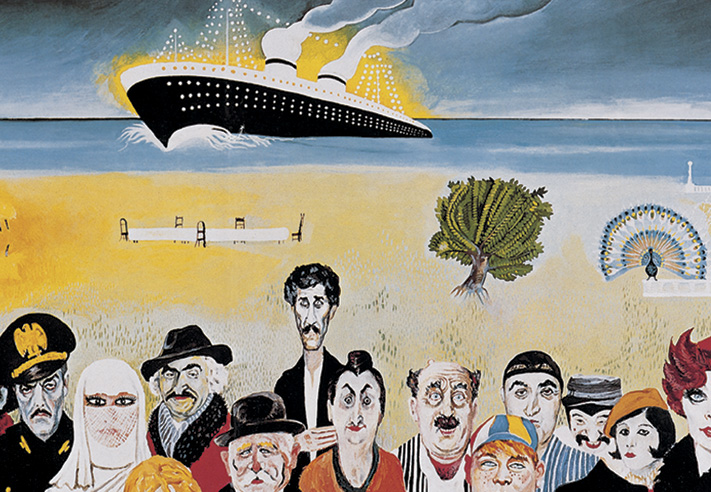
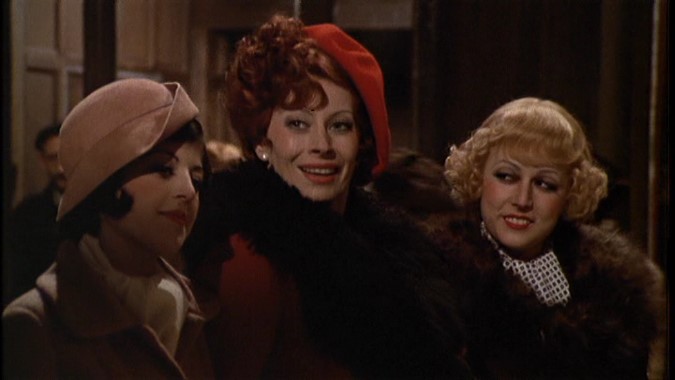


Amarcord
Italy/France, 1973 Director: Federico Fellini
A small Italian town, during the Fascist period. The end of winter is announced by the arrival of manine, a white fluffy substance that blows into the province. That night, a large bonfire is built in the city square to celebrate the beginning of spring; a local resident recounts some of the town’s history. Volpina, the village whore, walks along the beach and flirts with construction workers, including Aurelio Biondi. At a stormy family dinner, Aurelio screams at his teenage son Titta for not working, and Titta is later sent b y his mother, Miranda, to the priest for confession. Asked whether he masturbates, he recalls and imagines several encounters with women in the town. A fascist rally is held to greet a visiting dignitary. That night, the police shoot down a gramophone from a church tower when they hear it playing a “subversive” song; prevented by Miranda from attending the rally, Aurelio is brutally interrogated by the police. Read more
This review of Jacques Rivette’s weirdest film, from the Winter 1976/77 issue of Sight and Sound, is one of the few pieces of my significant writing on Rivette from this period that hasn’t already been reproduced either on the excellent web site devoted to Rivette, “Order of the Exile,” or on this web site (e.g., my essay for Film Comment about Duelle). Having spent five very memorable days during the summer of 1974 watching the shooting of Noroît, in and around a 12th century fortress on the Brittany coast (see “Les Filles du Feu: Rivette x 4″, an article I wrote with Gilbert Adair and the late Michael Graham, reproduced on “Order of the Exile”), this was a film that I found in some ways even more compelling as a project than as a realized work.—J.R.
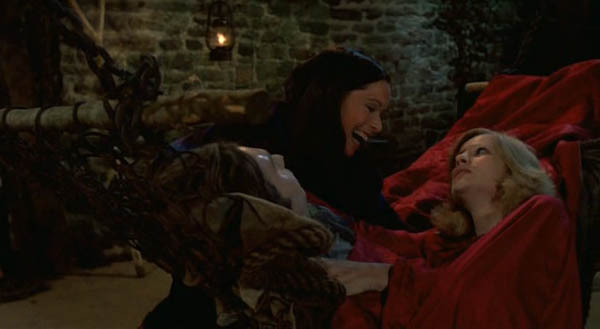
Noroît
If each new Rivette film marks a decisive break as much as a discernible development, Part III in the projected Scènes de la Vie Parallèle — the second film made in the tetralogy — reinforces this principle with a vengeance. Receiving its world premiere at the London [Film] Festival, immediately after a screening of Duelle (Part II of the cycle, discussed in my Edinburgh article elsewhere in this issue), Noroît has already occasioned the sort of extreme realignments provoked by Spectre after L’amour fou, or by Duelle after Céline et julie vont en bateau. Read more
I still seem to be in a minority in preferring Family Plot to Alfred Hitchcock’s other late films, but after reseeing the film countless times, I’m not about to revise my opinion. It would appear that some of Hitchcock’s biggest champions, such as Robin Wood, have tended to dismiss the film because it isn’t sicker. I tried to respond to their criticism at least provisionally in the opening of this review, written for the summer 1976 Sight and Sound, which they ran as their cover story for that issue and which I’ve revised, but only minimally. — J.R.
Family Plot
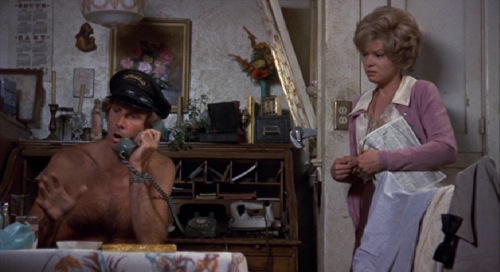
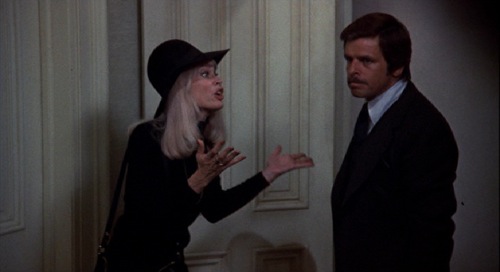
“Everything’s perverted in a different way,” Hitchcock has noted; and perhaps no other filmmaker has illustrated this postulate better, by starting from precisely the opposite premise. Without a well-established sense of the normal, the abnormal doesn’t even stand a chance of being recognized, and the director has always made it his business to offer all the right signposts and comforts to guarantee complacency before proceeding to unhinge it. Yet one of the rules of the game is deception, and if the Master’s artistry has been identified more with rude shocks than with the subtler conditioning which makes them possible, one can be certain that this too plays a role in his overall strategies. Read more
This appeared in the February 24, 1989 issue of the Chicago Reader. –J.R.

THE ‘BURBS
*** (A must-see)
Directed by Joe Dante
Written by Dana Olsen
With Tom Hanks, Bruce Dern, Carrie Fisher, Rick Ducommun, Corey Feldman, Wendy Schaal, Henry Gibson, Brother Theodore, and Courtney Gains.
Director Joe Dante is the perfect refutation of the idea that popular American comedies have to be simple. His movies are never pretentious or difficult to follow, but embedded in each of them are a sophisticated understanding of popular culture and an awareness of the multiple stances and positions that are possible within the confines of supposedly simple genre movies.
Gremlins offered an ambiguous cluster of proliferating beasties to illustrate a cautionary moral fable about magic; it also managed to be an amoral satire of the same facets of the American dream exalted in the fable. Innerspace postulated the injection of a miniaturized Navy test pilot (Dennis Quaid) into the body of a hypochondriac (Martin Short), leading to simultaneous and parallel narratives as each character’s progress influenced the other’s.
A knowledgeable connoisseur of the American cartoon, Dante makes movies that take place in the kind of manic world where anything can happen. This sensibility bore particular fruit in his segment of Twilight Zone: The Movie (set in a universe ruled by the mind of a vindictive little boy who loved cartoons) and the climactic sequence of his Explorers (a nightmarish Mixmaster version of American TV strained through the sensibility, body, and technology of an extraterrestrial mimic); both of these segments anticipated the subversive universe that other filmmakers developed on Pee-wee’s Playhouse. Read more








